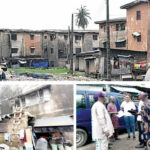Dr. Kehinde Alex Bankole, a well-known oil and gas magnate and real estate developer, is the Managing Director, KAB Construction. He speaks with ABIODUN AWOLAJA on President Bola Tinubu’s administration, subsidy removal, Nigeria’s housing and power crises, and sundry issues. Excerpts:
PRESIDENT Bola Ahmed Tinubu is only in his second week in office but some Nigerians are already giving him a pass mark. Don’t you think it is too early to judge him?
Well, it is not too early, judging by what we were used to in times past when you did not have a president that would come out to talk to you whenever there was an issue. Now, he has been able to change the narrative of not having a responsive and responsible president. At any given time now, he comes out and talks to us, saying “You know what? This is for our own good, for the betterment of the entire population of Nigerians.” I mean, Nigerians are beginning to see that this is different from the norm.
The norm is that the former presidents did not even care about us, they did everything at their own pace; they did not give a damn about what happened. But, I mean, give it to Tinubu. Look at all the actions he has taken: in less than two weeks, he has removed subsidy, which no president before him had been able to do. It takes a man with guts to have been able to do that. And you know what? He is going to damn the consequences. This is actually part of his electioneering campaign where he said that “We are going to remove subsidy. If you like, protest from now till next year, we will remove subsidy.” Subsidy is a cancer that has eaten deep into our system, so kudos to him. He’s doing what we have not seen in the past. Look at the electricity bill: states can now generate their own power.
What do you find striking about his personality and leadership style?
The leadership that he has exhibited in the last two weeks since he became the president is amazing. I wouldn’t know how many Nigerians have been able to see the fact that this president has been able to bring that office (the Presidency) down to people’s level. I have been watching him closely and a lot of people are waiting for him to commit errors but he has not. One of the high points that I have seen was when he received the service chiefs; he stood up from his own seat and went round shaking hands with them. He was not shaking hands with them officially; he was shaking hands with them in a friendly manner. He was indirectly saying: “I am not your lord, I am your servant.” I believe that every sane, patriotic Nigerian who is passionate about this country would look at that clip with pride. I think that was his first meeting with the service chiefs. His personality is striking; he talks to people and carries them along.
You sound so confident about Tinubu. Why is this so?
Well, my confidence in him goes back to the bedrock of development when he was governor of Lagos. I love facts, I am a student of history. I know how Lagos used to be before he became governor in 1999. And when he became governor, after his eight years, we could see what Lagos became. And that is actually what paved the way for people like me. I came all the way from Kwara. To the glory of God, I am a construction magnate. I own an estate that I am building. He (Tinubu) was able to lay that foundation for many people. People have been coming to Lagos from all over the world. Somebody made that place homely, eye-catching and enchanting for people.
The removal of subsidy coming after a nasty experience with cash crunch is a bitter pill for Nigerians. What is your assessment of the situation?
Nothing good comes easy. The earlier we remove subsidy, the better for all of us. I mean, it affects everybody; it affects those of us in the construction industry. Those of us who had actually sold some buildings at a particular time cannot go back to our subscribers and tell them that subsidy has been removed and so they need to pay more. The cost of building materials is actually going up but you know, subsidy removal is a tough decision that we need if we must move forward.
The typical example I usually give to my people is this: “You are working for your family, say a family of five, and you are earning a salary that is meant to feed a family of five but at the end of the day, you discover that your salary is being spent on a family of 200 people. How do you cope? You are going to collapse.” That is the typical example of what subsidy removal means to the Nigerian economy. The president said we can no longer continue to be Father Christmas to the neighbouring countries. Our subsidized petroleum was taken to Lome, Togo, and other places at our own expense. We were the ones paying for it and the people in those countries were the ones enjoying the benefits. Yet tomorrow, somebody would tell me there is stable power supply in Ghana, Togo, Benin Republic. These countries were feeding fat on us. Subsidy had to go. Nigerians should appreciate the fact that President Tinubu has been able to take this step that nobody had been able to take in the past.
The Dangote refinery is coming on stream but there is no competition. What is deregulation without competition?
There will be competition. It is just a matter of time. At a time in this country, we had only Econet, but then MTN came and Globacom also did. There are thousands of modular refineries that are coming up; it’s just that they are not well publicised. Some state governments are actually working on their own modular refineries. Edo State is working on one, which will start operations soon. There will be competition. Dangote has done well by giving us a refinery but more businessmen are actually interested in building refineries.
As a construction expert, how do you think we can solve the question of the housing deficit that we have across the country?
The number one way we can solve the housing deficit in the country is the sincerity of the government in helping the construction industry. We actually have a lot of housing deficits in Nigeria. If the government is actually ready, let them give us funds or grants or whatever they are going to call it. Let them make it more accessible. In Lagos, I can tell you that we have countless numbers of people that are homeless. But I think I heard the president say during the campaigns that he would bring about a credit economy if he won the election. If you want a N100 million house and you can get credit, provided the government is actually subsidizing, you just approach the construction companies.
They ask how many units you are actually putting up, maybe 200 units. The Federal Government can just say “okay, I’m going to pay you the money, but you have to sell housing units to my people at a discounted rate while they continue to pay on credit.” By so doing, we would have a lot of buildings springing up in Lagos and every other part of the country. The government really has to support the construction industry and the real estate industry if the housing deficit in Nigeria is to be bridged. The government also needs to work on bringing the prices of raw materials down. It is too high. Of course, we sell what we buy.
What critical issues should President Tinubu address immediately?
Let me talk about the construction industry. He should address the issue of ‘displaced’ engineers from foreign lands that have actually invaded Nigeria. He should start giving the construction of our major roads to Nigerian contractors and construction magnates. Let Nigerians build Nigerian roads for Nigerians. By so doing, you hold Nigerians responsible for the development of their own country. But in a situation where you saddle foreigners with the responsibility of taking care of Nigerian roads, they can do whatever they like with them. I think that the president, with his background and as someone who has been close to people over the years, should be able to look at that area. That would make his government popular. Let Nigerians build Nigerian infrastructure. We have good engineers. The majority of engineers coming from abroad don’t even have addresses over there. Many of them don’t even know anything.
Another major problem is power but the government has now liberalised the sector, giving states power to generate and distribute it. How do we go forward from here?
Beautiful. Tinubu has taken a bold decision. By giving states and individuals the power to generate power, we will achieve a whole lot. Private business organisations will come up and the market will become competitive. It is just like an adage that says that when a woman doesn’t have rivals, she tends to misbehave, but the moment she does, she sits up. I am telling you that one of the best news around is the president signing that electricity bill.
How does your background relate to your present engagements?
I actually studied physics at the university and architecture at the polytechnic. If you look at my surname, Bankole, it means “Help build me a house.” This is actually what I do. Not only my background connotes what I do, even my name also does.
READ ALSO FROM NIGERIAN TRIBUNE






